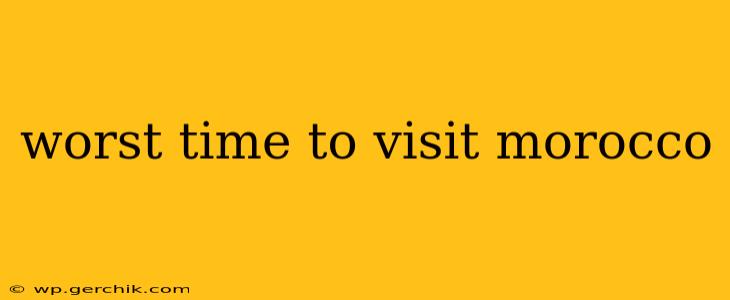Morocco, a land of vibrant culture, stunning landscapes, and rich history, offers something for every traveler. However, the ideal time to visit is crucial for maximizing your experience and avoiding discomfort. While many months offer pleasant weather, certain periods are less desirable due to extreme weather conditions, crowds, or high prices. This guide will explore the worst times to visit Morocco, helping you plan your trip for optimal enjoyment.
What are the peak seasons in Morocco?
Before diving into the least favorable times, it's important to understand when Morocco is most popular. Peak season generally runs from March to May and September to October. During these months, you'll find the best weather, but also the largest crowds and highest prices. This increase in tourism can impact your ability to find accommodations and experience attractions without significant lines.
What is the hottest time to visit Morocco?
Summer (June to August): This is often cited as the worst time to visit Morocco, primarily due to the intense heat. Temperatures in many areas, particularly in the desert regions, can soar above 40°C (104°F), making sightseeing incredibly challenging and potentially dangerous. The heat can also impact your enjoyment of outdoor activities and exploration. While coastal areas offer some respite, the inland regions become unbearable for many.
Is it better to visit Morocco in the winter?
Winter (November to February): While generally less crowded and offering lower prices, winter in Morocco brings its own set of challenges. While southern regions remain relatively mild, the northern parts of the country, including the Rif Mountains and the Atlas Mountains, experience significant rainfall and even snowfall in higher altitudes. This can disrupt travel plans and make exploring certain areas difficult. Additionally, some accommodations may be closed during this less busy season.
What are the rainy months in Morocco?
Rainy Season (October-April): While Morocco isn't known for torrential rain, it does experience a rainy season that primarily affects the northern regions. This period can impact travel plans, with potential delays and road closures. It's essential to check weather forecasts regularly and be prepared for some disruption to your itinerary if travelling during these months.
Are there specific holidays that impact travel to Morocco?
Religious Holidays & National Holidays: Similar to any other country, major religious and national holidays in Morocco can impact travel. These periods often see a surge in domestic tourism, leading to increased prices and potential overcrowding at popular attractions. It's advisable to research Moroccan public holidays before booking your trip to avoid potential issues.
What is the best time to visit Morocco?
While the worst time to visit is generally during the summer months due to extreme heat and the peak season months due to higher prices and crowds, the ideal time is really dependent on your priorities and tolerance for crowds and heat. For pleasant weather and fewer crowds, Spring (March-May) and Autumn (September-October) are the sweet spots.
By considering these factors and planning accordingly, you can have a fantastic Moroccan adventure, avoiding the less favorable periods and maximizing your enjoyment of this captivating country. Remember to always check the latest weather forecasts and travel advisories before your trip.
